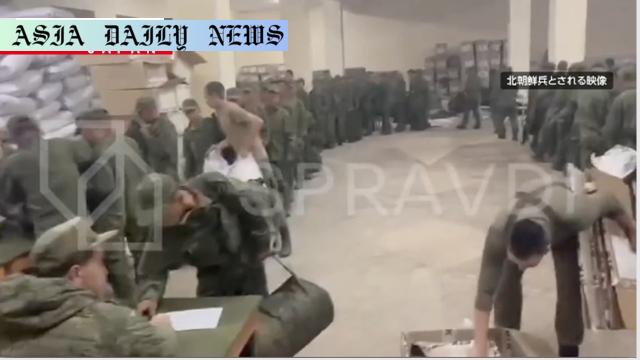North Korea to deploy more reinforcements to support Russia in intense Kursk battles following heavy casualty reports.
North Korea plans to send more troops to Russia’s Kursk region within two months.
Reports reveal heavy North Korean casualties since their deployment last fall.
Approximately 11,000 soldiers were sent, with around 1,000 fatalities.
Russia faces increasing resistance from Ukrainian forces in the region.
President Zelenskyy condemns further Russian missile attacks in Zaporizhzhia.

Introduction: Rising Alliance Amid War
As the war in Ukraine intensifies, reports have surfaced indicating that North Korea plans to bolster its military support for Russia. According to statements from a senior US defense official, North Korea is preparing to send additional troops to the western region of Kursk within the next two months. This development highlights a growing alliance between Moscow and Pyongyang, shedding light on the global implications of the conflict in Ukraine.
Background: Initial Deployment and Casualties
North Korea initially deployed approximately 11,000 soldiers to Kursk last fall. These troops were dispatched to assist Russian forces in attempts to reclaim territory lost to Ukrainian advancements. However, a staggering one-third of these soldiers have reportedly been killed or wounded, according to Ukrainian and American officials. By mid-January, the BBC reported that around 1,000 North Korean soldiers had been killed, signaling the scale of the losses incurred in harsh combat conditions.
Adapting to Battlefield Challenges
Initial reports indicate that the North Korean soldiers lacked combat experience at the time of their deployment. However, this is rapidly changing. Ukrainian drone commanders have noted that these troops are now gaining significant battlefield experience, becoming more effective and resilient in combat. This evolution raises concerns for both Ukraine and its Western allies as they continue to face a determined, increasingly capable enemy coalition.
Strategic Importance of Kursk and Reinforcement Plans
The Kursk region is strategically critical to Russia’s military objectives, serving as a key battleground for control over occupied territories. The anticipated arrival of North Korean reinforcements underscores Russia’s desperate need for personnel amidst mounting casualties and growing Ukrainian resistance. Western officials and analysts believe this move could prolong and escalate the conflict, further destabilizing the region.
Humanitarian Impact: The Toll on Civilians
Meanwhile, the situation in Ukraine continues to deteriorate for civilians. In the southern region of Zaporizhzhia, a Russian missile and drone attack resulted in the death of one individual and injuries to 45 others. President Volodymyr Zelenskyy condemned the attack, noting that even rescue workers responding to the aftermath were wounded in ongoing shelling. Such acts highlight the devastating human toll of the conflict, causing suffering far beyond the battlefield.
Geopolitical Implications and International Response
The alliance between Russia and North Korea has raised alarms among Western nations. By securing military support from Pyongyang, Moscow is receiving critical reinforcements as it contends with depleted resources and manpower. However, this partnership also risks North Korea facing further international sanctions and isolation. Western policymakers must now grapple with the broader implications of this evolving alliance, exploring strategies to counter these emerging threats.
Conclusion: A Worsening Crisis
The latest developments reveal a troubling escalation in the ongoing Ukraine conflict. North Korea’s decision to dispatch more troops not only strengthens Russia’s position but also poses new challenges for Ukrainian forces and their allies. As the war continues to evolve, the international community must remain vigilant in addressing the multifaceted repercussions of these actions. Strong diplomatic and strategic measures are necessary to curtail further escalation and restore peace in the region.



Commentary
A Dangerous Partnership
The reported collaboration between North Korea and Russia marks a significant development in the Ukraine conflict. While alliances in warfare are not new, this specific partnership draws attention due to the unique challenges it presents. North Korea’s entry into the Russo-Ukrainian conflict could embolden Moscow’s efforts, potentially prolonging bloodshed and complicating international intervention efforts. This development reflects broader shifts in global power dynamics, where historical adversaries and isolated states forge partnerships to challenge their geopolitical rivals.
Human Cost and Moral Dilemmas
As more troops are sacrificed in the name of territorial dominance, the human toll of this partnership cannot be overstated. Reports of high casualty rates among North Korean soldiers should serve as a grim reminder of the conflict’s devastating cost. It is tragic that inexperienced soldiers are thrust into a war they have little stake in, only to face the horrors of modern warfare. This raises important ethical questions about the role of state alliances that place vulnerable individuals in harm’s way.
The Role of the International Community
The involvement of North Korean forces in Ukraine underscores the need for a robust international response. Global powers must collaborate to apply diplomatic pressure on both Russia and its allies, including Pyongyang. Doing so not only holds these nations accountable but also sends a clear message that partnerships formed to fuel conflict and destabilize regions will not be tolerated. Strengthening sanctions and exploring avenues for negotiation could play pivotal roles in de-escalating the crisis.